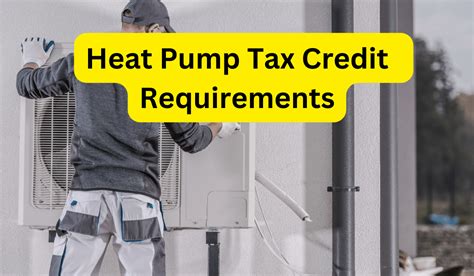Maximize Your Savings: Unlock Tax Rebates for Installing a Heat Pump
In recent years, energy efficiency has gained significant attention, not only as a means to reduce carbon footprints but also as a way to save money. One of the most effective methods to achieve both goals is through the installation of heat pumps. This article will explore how heat pumps work, their benefits, the potential savings involved, and how you can unlock tax rebates to maximize your savings.
Understanding Heat Pumps
Heat pumps are innovative devices that transfer heat from one place to another, either heating or cooling a space depending on the season. They operate by using a small amount of energy to move heat rather than generate it. This method makes heat pumps one of the most energy-efficient systems available for heating and cooling your home.
Types of Heat Pumps
- Air Source Heat Pumps: These are the most common type and work by extracting heat from the outdoor air, even in cold temperatures.
- Ground Source Heat Pumps: Also known as geothermal heat pumps, these systems rely on the stable temperatures of the earth to provide heating and cooling.
- Water Source Heat Pumps: These systems use bodies of water, such as lakes or wells, to provide heating and cooling.
Benefits of Installing a Heat Pump
Installing a heat pump can yield numerous advantages, including:
- Energy Efficiency: Heat pumps can reduce energy consumption by up to 50% compared to conventional heating systems.
- Lower Utility Bills: The increased efficiency leads directly to lower monthly utility bills.
- Environmental Impact: By reducing energy use, heat pumps help decrease greenhouse gas emissions.
- Longevity: Heat pumps typically have a longer lifespan than traditional heating systems, often lasting more than 15 years.
Understanding Tax Rebates and Incentives
Various federal, state, and local programs offer tax rebates and incentives for energy-efficient home improvements, including heat pump installations. These programs aim to encourage homeowners to invest in greener alternatives, contributing to long-term energy sustainability.
How to Unlock Tax Rebates for Heat Pumps
- Research Available Programs: Start by researching the tax rebates and incentives offered in your area. Visit websites such as Energy Star or your local government’s energy office for a comprehensive list.
- Consult with HVAC Professionals: Speak with certified professionals who can help you navigate the requirements to qualify for specific programs. They can explain which types of heat pumps are eligible for rebates.
- Keep Documentation: Ensure you keep all receipts, warranties, and documentation of your installation, as these will be necessary for claiming your rebate.
- File Your Taxes Correctly: Follow the instructions specific to the rebates you are claiming, as some may require different methods of reporting on your tax return.
State-Specific Incentives
While there are federal tax rebates available, many states have their own unique incentives. For instance:
- California: Offers the Self-Generation Incentive Program (SGIP) which includes heat pumps.
- New York: The NY-Sun program provides incentives based on energy savings.
- Texas: Has various local utility incentives that may lower installation costs significantly.
Potential Savings from Heat Pump Installation
The financial incentives combined with the operational savings can lead to substantial savings over time. Let’s break down the potential savings:
- Installation Rebates: Depending on your local and state programs, you can receive rebates ranging from $500 to several thousand dollars upon installation.
- Annual Energy Savings: Homeowners can expect annual savings of between 20% and 50% on their heating and cooling bills, translating to hundreds of dollars each year.
- Maintenance Costs: Regular maintenance for heat pumps is generally lower than for conventional systems, reducing overall costs.
Conclusion
Investing in a heat pump not only benefits the environment but also your wallet. By understanding the available tax rebates and incentives, homeowners can maximize their savings while contributing to a more sustainable future. Take the time to research your options, consult with professionals, and ensure you have all the documentation needed to apply for the rebates available in your area. By making an informed decision, you can unlock long-term savings and enjoy the comfort of an energy-efficient home.
FAQs
1. What is a heat pump?
A heat pump is a device that transfers heat from one location to another, providing heating in winter and cooling in summer. It utilizes a refrigeration cycle to move thermal energy.
2. Are heat pumps efficient for all climates?
Heat pumps are highly efficient in moderate climates. In extremely cold regions, specialized models, such as cold climate heat pumps, are designed to work effectively.
3. How much can I save with a heat pump?
Homeowners can expect annual energy savings of 20% to 50%, translating to significant savings on utility bills, in addition to any available rebates.
4. How do I apply for tax rebates?
To apply for tax rebates, research local, state, and federal programs, work with HVAC professionals, and keep all relevant documentation to submit with your tax return.
5. What kind of maintenance do heat pumps require?
Heat pumps require regular maintenance including filter cleaning or replacement, checking the refrigerant levels, and ensuring the outdoor unit is free of debris. This helps maintain efficiency and prolong lifespan.
Download Tax Rebate For Heat Pump
